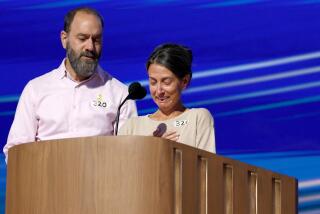PERSONAL PERSPECTIVE : The Day the Image of Palestinians Finally Acquired a Human Face
- Share via
ITHACA, N.Y. — In Middle East political history, Madrid, like Camp David and Geneva, has already acquired a special meaning. It will be remembered for a special moment in the torturous history of Arab-Israeli confrontation, when, for the first time, Israel met face-to-face with all its primary opponents. And it will be recalled, like Camp David, as an instance of success for U.S. diplomacy, whether or not the process bears fruit.
But, above all, it will be remembered as the moment when the Palestinians, dehumanized and excluded for decades, acquired a human face.
Consider the Palestinian spokeswoman, Hanan Ashrawi, a Westernized professor, representing one of the earlier sects of Christianity, engaging her audience with reason and moderation. Or consider the head of the Palestinian delegation, a man who looks like anyone’s father, a warm, intelligent doctor--a perfect representation of the Palestinian middle class. Or consider the Palestinian advisers, among them academics at American institutions, parents whose children play Little League baseball. All this adds up to an image once reserved for Israelis. It is also a far cry from the image of the terrorist that has saddled the Palestinians for many decades.
Suddenly, the argument, often used by some Israelis, that “there are no Palestinians with whom to talk” lost its relevance. These Palestinians, seen meeting with the prime minister of Israel, with the secretary of state of the United States, with the foreign minister of the Soviet Union, cannot be ignored or shoved aside; their legitimacy cannot be questioned.
The irony for Palestinians is that this image transformation, long overdue, came with the inadvertent help of Yitzhak Shamir, who insisted that the Palestine Liberation Organization be excluded from the negotiations, then further insisted that Palestinians from East Jerusalem not be part of the delegation. As a consequence, the face of the PLO, conjuring up to the West an ugly Palestinian image, became almost invisible.
In addition, the exclusion of East Jerusalem Palestinians, like Ashrawi and Faisal Husseini, despite their obvious influence and legitimacy, forced an effective Palestinian negotiating posture: Besides the official delegates, a second tier of more influential Palestinians acted as their advisers, speaking out and gaining an audience. And even though the PLO is almost invisible in this enterprise, it remains central in that no Palestinian decision can be made without its--and Yasser Arafat’s--approval.
In this decentralized scheme of Palestinian decision-making, the Palestinians have inadvertently overcome one of the biggest obstacles facing Arab bargaining--the clustering of power, visibility, in the hands of one man. As many Egyptians have learned in past negotiations with Israel, their presidents, most notably Anwar Sadat, were susceptible to mistakes from which they could not back down. Since he was so obviously the final arbiter in all Egyptian decisions, when Egypt was perceived to be intransigent, Sadat could be directly blamed, and the pressure on him would become relentless. Had Arafat, with his image baggage, headed a Palestinian negotiating team, the Palestinian bargaining position would have been even more vulnerable.
Instead, the Palestinian negotiating team enjoys some of the same organizational advantages that Israel has always enjoyed. Responsibility cannot easily be pinned on one individual. Mistakes by Palestinian negotiators can be corrected by the next tier of authority. Image problems are corrected by a division of labor. Proliferation of opinions and views within the Palestinian community appear more natural.
This does not mean, however, that the power of the PLO has eroded within the Palestinian community in favor of a new local leadership in the West Bank and Gaza, or that Arafat has lost his influence. Decision-making within the Palestinian community has always been somewhat diffused, with the Palestinians under occupation acquiring greater influence since the intifada began.
That the PLO still commands much influence in the occupied territories was evident only a few days ago. In an unusually free election for the Gaza Chamber of Commerce, PLO candidates won 13 of the 16 slots, at a time when the more radical Islamic movement, Hamas, was expected to be the winner. The vote must also be seen as a vote in favor of the peace process endorsed by the PLO.
Despite the organizational advantages that the Palestinian team has attained as the accidental consequence of a tough Israeli position on the makeup of the Palestinian delegation, the Palestinian position remains weak, because of the asymmetry in Israeli-Palestinian leverage. Israel controls the territories and a formidable army. The Palestinians are either under occupation or homeless--and without a real military option. No organizational advantage can overcome this asymmetry.
Still, Madrid must be celebrated by Palestinians, whose difficult and tragic drive for acceptance, legitimacy and normalization in a world of nationalism has finally born some fruit. The world has finally come to see the real face of the Palestinians.
More to Read
Sign up for Essential California
The most important California stories and recommendations in your inbox every morning.
You may occasionally receive promotional content from the Los Angeles Times.













